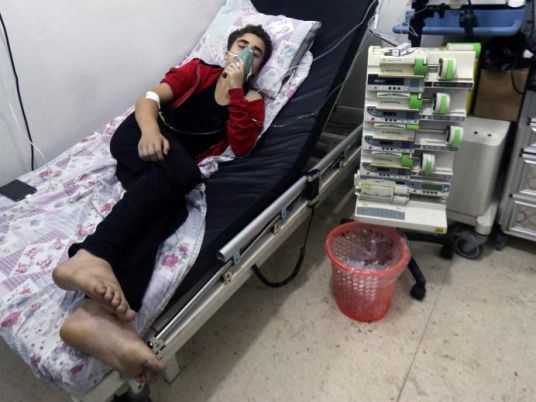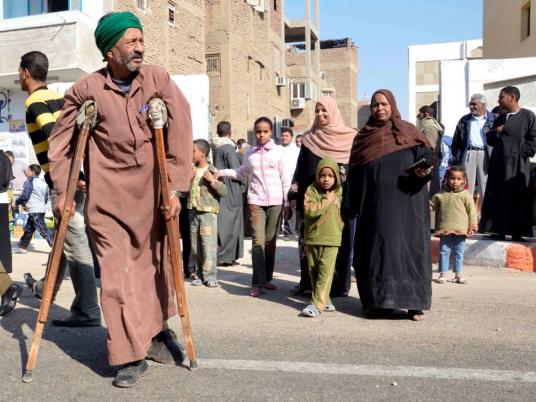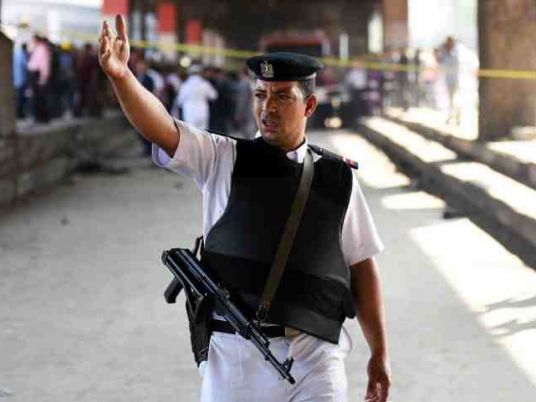Inside Abdel Rahim al-Qenawy mosque in the Upper Egyptian governorate of Qena, members of the Taramsa and Homaydat tribes sit together as religious clerics and community leaders lecture them about the value of forgiveness.
Someone recites from the Quran, and then the attendees hug and kiss each other with the compassion of friends meeting after a long separation. Refreshments are served as the leaders of both tribes sign a paper document.
This meeting ends a land dispute between the two tribes that evolved into an armed feud that raged for two weeks, endangering the lives of members of both tribes as well as other Qena residents caught in the crossfire.
It is an informal gathering that has succeeded where the law failed. Just a few days earlier, Qena’s head of security tried to broker a peace treaty between the tribes. It quickly fell apart.
Informal reconciliation councils started hundreds of years ago in the tribal areas of Egypt as the only means of resolving conflicts. Today, this tribal tradition is still the most effective method of conflict resolution in many parts of the country.
Reconciliation committees, which are comprised of community leaders and religious figures who coordinate with the government. But while their effectiveness is clear, there are fears that dependence on them undermines the rule of law.
The informal reconciliation sessions are supposed to parallel legal procedures, but in some recent incidents of sectarian violence, they substituted for legal action and the assailants escaped legal consequences. For this reason, Coptic clerics and some human rights activists see the practice as counterproductive.
“The lack of accountability in the incidents of Atfeeh and Qena is what led to Imbaba,” says Ahmed Ragheb of the Hisham Mubarak Law Center, referring to the sectarian clashes that took place in the Cairo neighborhood of Imbaba on Saturday night, leaving 12 dead and hundreds injured.
Following a reconciliation session, no one was prosecuted for the burning of a church last March in Atfeeh, a village in Helwan. The same happened after extremists cut off the ear of a Christian in Qena the same month and burned his house and car. The issue ended in reconciliation with no legal repercussions.
“A lot of the time, informal reconciliation sessions are used as a substitute for legal action and a way out of the legal framework, which leads to justice being thrown out of the window,” says Ragheb.
According to the law, crime suspects are tried for violations against their victims as well as against society at large, which is why Ragheb says that even when the victim agrees to reconcile, the suspect should still be tried for violations against society at large.
Salah Saleh, a member of the reconciliation committee that brokered the peace agreement between the Homaydat and Taramsa tribes, says the reconciliation committee’s work is actually very intricate.
When a conflict arises, a tentative reconciliation committee is formed and suggested to both parties. Both sides then have the right to reject any members of the committee. A second round of elimination then takes place by the police before the committee members are finalized.
A fact-finding committee is then formed to investigate the events with the help of legal experts. This committee assesses the damage done on each side and arrives at a fair settlement. Meanwhile, challenging negotiations take place with both sides to convince them to stop violent retaliations.
The sustainability of the peace agreement is assured, not only by the penalty clause in the agreement (LE500,000 in the Taramsa and Homaydat reconciliation contract), but also by the strength of the tribal code of honor, which prevents members of the tribe from breaking the agreement after tribal leaders sign it.
“This may be an informal committee but its findings are binding,” says Saleh.
Assem al-Dessouky, a historian, attributes the continuing implementation of informal reconciliation to a lack of trust in the legal system in Egypt and to the nature of tribal communities, where tribal powers are much more respected and effective than the law. Tribal powers have acquired even more legitimacy after successfully protecting their areas during the absence of police in the period starting 28 January.
“In the mind of the people living in tribal communities, the tribe is their country and hence it is ruled by the president of the country, who is the head of the tribe,” says Dessouky.
Mohamed Nabil, a police lieutenant, says that the tribal traditions are so deeply rooted in some communities that police would not be able to challenge traditional reconciliation even if they wanted to. Such was the case in the strife between the Homaydat and Taramsa tribes, in which a solution offered by the police, unsupported by tribal forces, failed to resolve the issue.
“In places where tribalism reigns, we have to respect their traditions. The word of the seniors there is stronger than law and court orders,” says Nabil.
Nabil says that in tribal cultures, a legal solution alone would fall short of preventing the series of violent retaliations that follow certain crimes in which people have died or the tribe’s honor has been damaged.
“A court case doesn’t solve the initial problem that caused the conflict, but when we resort to this solution to get to the root of the problem, we will prevent further retaliation that can cause more bloodshed,” says Nabil.
There are calls for a halt the use of informal reconciliation agreements in place of deterrent legal action. That may seem the fastest way to stop bloodshed, but they also threaten modern concepts of justice, fairness and accountability in some Egyptian communities.
The members of the Taramsa and Homaydat tribes celebrated their peace with two huge gatherings, exchanging apologies and vowing to return to the close and cordial relations they had before the land dispute. For them, the system seems to work well.




